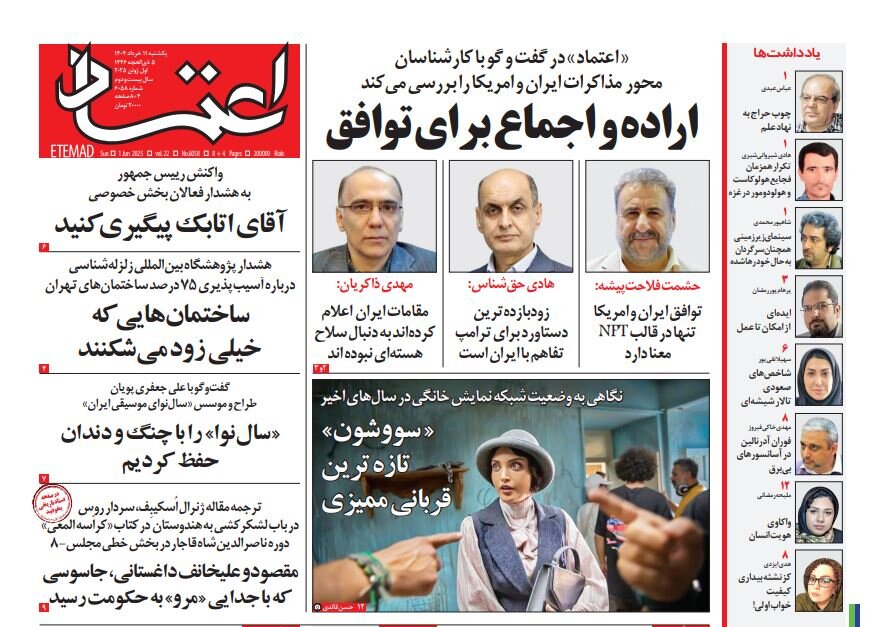Tehran – Etemad examined the possibility of a nuclear agreement between Iran and the United States and investigated the previous obstacles in an interview with reformist political activist Ali Bagheri.
He said: The parties to these negotiations are trying to reach a commonality of understanding and stability for a variety of reasons. Therefore, despite all differences between the parties, the path to agreement is finally opened. For a variety of reasons, there is a will to agree on both Iranian and American aspects. Iran’s foreign policy shows change. Trump also needs important foreign policy achievements during the first four months of his presidency. Trump has not managed to end the war between Russia, Ukraine and Gaza-Israel. In the meantime, the Iranian incident can save Trump’s face. There is good news about the impending agreement. Both parties need to agree on global and regional terms and will ultimately be achieved.
Ettelaat: IAEA Committee’s Destiny Movement Against Iran
In his commentary, Etterat addresses the IAEA Governor’s Committee’s fateful moves against Iran, writing: Western diplomats argue that the West is trying to put pressure on the IAEA Commission’s states to take action against Iran at the upcoming quarterly meeting of the international organisation. The move could anger Tehran, complicate negotiations between the US and Iran over sanctions and address concerns about the country’s nuclear program. Iran has always rejected the Zionist regimes and Western claims about its nuclear program, emphasizing that its nuclear technology is intended solely for peaceful purposes. The immediate impact of the resolution is likely in Tehran’s negotiations with Iran’s subsequent actions on the United States and its nuclear program. Russia and China are the only countries that have consistently opposed such resolutions. Iran usually responds sharply to the resolutions and criticism of the IAEA Committee, taking actions such as accelerating and expanding its uranium enrichment programme, and preventing the presence of senior IAEA inspectors.
sobh-e-no: America seeks double plan for Iran
Sobh-e-no wrote about negotiations and potentially core agreements. The Americans are clearly negotiating on two parallel plans. Plan 1 is based on media pressure, promoting the idea that agreement is within scope and seeks to impose a zero expansion condition. Conditions that are unacceptable to Iran and are fundamentally in conflict with the principle position of the Islamic Republic. Plan 2 is based on recognizing Iran’s rights to enrich uranium, and offers such as forming an international consortium to monitor and participate in enrichment activities. The plan appears to be proposed by one of the Persian Gulf Arab countries, but has not met any objections from Iran and remains on the table as one of the possible options. In this regard, a recent visit from Pezeshkian to Oman conveyed a specific message within the framework of the second plan. During the visit, some progress has been made, claiming that Iran will receive serious guarantees to protect nuclear rights. Sources say reliable enforcement assurance was one of the key issues in Omani’s speeches.
Sazandegi: Dual Creation
In the article, Southern Degi deals with Trump’s psychological activities against Iran, saying: A careful analysis of Trump’s statement reveals that he is trying to convey a message that the agreement is within reach, but clearly confirms that they (Iran) have no access to nuclear weapons. On this issue, it should be noted that our country’s negotiation teams essentially believe that the US is playing with words through the media and injecting some information. US negotiation teams use disinformation at different times for negotiations. This is a question that our country’s diplomats have criticized many times. Given all these interpretations, it should be noted that the continuation of this process by the US could cause a kind of psychological aspect to Iranian public opinion and our country’s negotiating team. Even in this respect, commentary and news from European media can complicate the process and increase its psychological, media and political costs.

